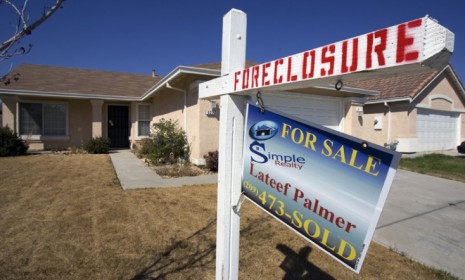The $26 billion foreclosure fraud settlement: By the numbers
The government and big banks strike a deal over alleged foreclosure abuses. Where will the money go?

A free daily email with the biggest news stories of the day – and the best features from TheWeek.com
You are now subscribed
Your newsletter sign-up was successful
After months of difficult negotiations, government authorities announced Thursday that they have reached a $26 billion settlement with five of the nation's biggest banks over their flawed and fraudulent foreclosure practices. The deal is intended to help troubled borrowers by lowering their mortgage rates and the amounts they owe on their homes. It also will provide restitution to people hit by mortgage-related abuses, such as the "robo-signing" of documents to speed up foreclosures. Who will the deal help, and how much relief will they get? Here, a brief guide to the settlement, by the numbers:
$26 billion
Total value of the settlement
The Week
Escape your echo chamber. Get the facts behind the news, plus analysis from multiple perspectives.

Sign up for The Week's Free Newsletters
From our morning news briefing to a weekly Good News Newsletter, get the best of The Week delivered directly to your inbox.
From our morning news briefing to a weekly Good News Newsletter, get the best of The Week delivered directly to your inbox.
$30 billion
Value of the deal if nine more mortgage-servicing institutions sign on to the settlement. To date, it just involves Wells Fargo, Bank of America, J.P. Morgan Chase, Ally Financial, and Citigroup
$17 billion
Relief earmarked for homeowners. The money will go toward lowering mortgage balances for people who are "underwater" — meaning that they owe more on their mortgages than their properties are worth
A free daily email with the biggest news stories of the day – and the best features from TheWeek.com
$20,000
Approximate average reduction in each loan's principal
2 million
Underwater homeowners who could be helped under the settlement
$700 billion
Total outstanding mortgage debt on the nation's underwater properties
$50,000
Amount those homeowners are underwater, on average
$3 billion
Relief that will come in the form of refinancing so that borrowers who are current on their mortgages, but underwater, can lower their payments by refinancing at today's historically low rates
$1.5 billion
Money earmarked as restitution to those who have lost homes to foreclosure
750,000
People who have lost their homes to foreclosure between January 2008 and the end of 2011 who will be eligible for payouts under the deal
$2,000
Average payment those people would receive
4 million
Americans who have been through foreclosure since early 2007
49
States that have signed on to the settlement. The lone holdout is Oklahoma.
$250 billion
Size of the tobacco settlement, a similar agreement between government and corporations, struck in the 1990s
Sources: Business Insider, NY Times, Think Progress, Wash. Post
-
 Political cartoons for February 18
Political cartoons for February 18Cartoons Wednesday’s political cartoons include the DOW, human replacement, and more
-
 The best music tours to book in 2026
The best music tours to book in 2026The Week Recommends Must-see live shows to catch this year from Lily Allen to Florence + The Machine
-
 Gisèle Pelicot’s ‘extraordinarily courageous’ memoir is a ‘compelling’ read
Gisèle Pelicot’s ‘extraordinarily courageous’ memoir is a ‘compelling’ readIn the Spotlight A Hymn to Life is a ‘riveting’ account of Pelicot’s ordeal and a ‘rousing feminist manifesto’